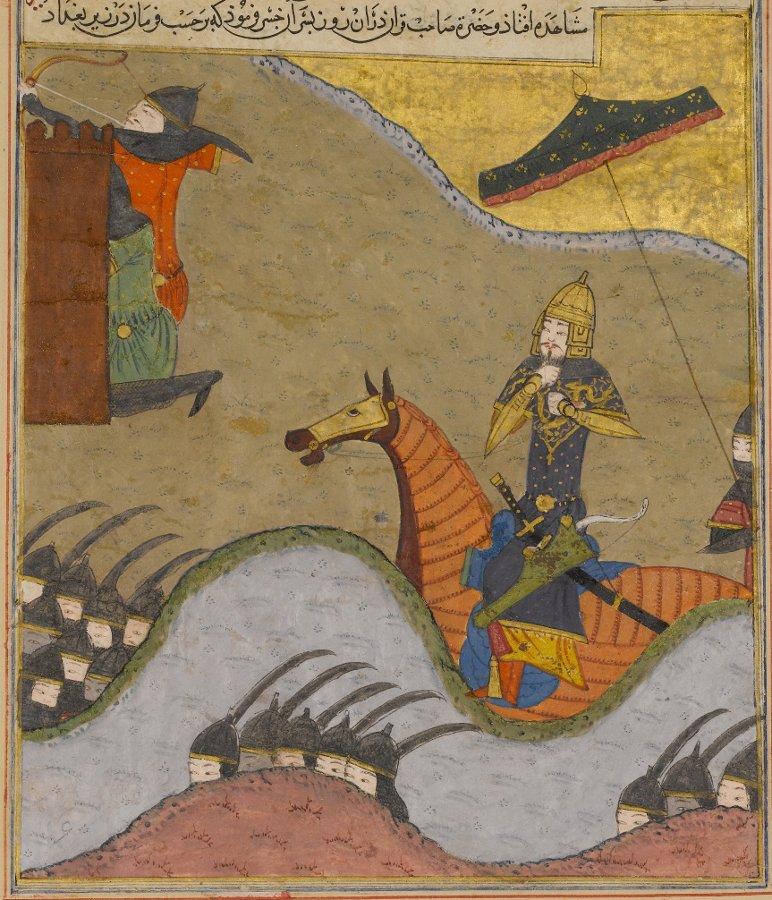Amazon Prime Student 6-month Trial

Find the perfect fit with Amazon Prime. Try Before You Buy.
'Conquest of Baghdad by Timur'
Zafarnama of Ibrahim Sultan, Timurid Shiraz, 1436.
(Book of Victories) of Sharaf al-din 'Ali Yazdi (1424-54)

A larger image of the 'Conquest of Baghdad by Timur' from the Zafarnama of Ibrahim Sultan, Timurid Shiraz, 1436.
"'Conquest of Baghdad by Timur'", Folio from a Zafarnama (Book of Victories)
Author: Sharaf al-din 'Ali Yazdi (1424–54)
Date: Dhu'l Hijja 839 A.H./A.D. June–July 1436
Medium: Ink, opaque watercolor, and gold on paper
Accession: 55.121.17
Shiraz
This folio once illustrated a manuscript of the Zafarnama, a biography of the ruler Timur commissioned by his grandson Ibrahim Sultan.
The text glorifies Timur’s many victories on the battlefield, including his 1401 siege of Baghdad, depicted here.
The distinctively spare yet highly animated angular compositions are characteristic of manuscript painting produced in Shiraz in this period.
Catalogue Entry
Although acquired by the Museum at two different times, these pages (67.266.1 and 55.121.17) were intended to be seen together.
They were painted on adjoining folios of a manuscript that was copied in Shiraz in 1436 by Ya‘qub ibn Hasan, known as Siraj al-Husaini.
The Zafarnama (Book of Victory) had been composed by Sharaf al-din ‘Ali Yazdi (d. 1454) only a few years earlier, in A.H. 828/1424–25 A.D.[1]
Yazdi’s narrative provides a vivid description of the siege of the Baghdad citadel by the Timurid army, an event that stretched over forty days in July and August 1401, a time of unrelenting heat.
As was his custom, Yazdi describes the roles played by the different divisions of the army and the positions taken by the most important princes and amirs. He also delineates Timur’s part in directing his army and overseeing the battle.
With respect to the citadel’s defenders, Yazdi stresses the fear instilled in them by the Timurid siege.
The deafening tumult of a simultaneous attack on all sides of the citadel, which was situated on the eastern shore of the Tigris, led the besieged to imagine that the Day of Judgment had arrived.
In desperation, many flung themselves from the citadel walls, only to be devoured by sharp-toothed creatures waiting in the water below.[2]
These two paintings re-create the mood and substance of Yazdi’s chronicle by contrasting the might of the Timurid army with the panic that has overtaken the Baghdad garrison.
In one (55.121.17), the painter highlights Timur’s role, showing him directing the battle while protected by his royal umbrella.
The siege itself and its equipment, described in detail by Yazdi, are alluded to by a soldier who shoots arrows from behind a wooden screen and by the massed weapons of the Timurid soldiers who populate separate pockets of the landscape surrounding Timur.
The facing page (67.266.1) shows the beleaguered defenders within the citadel walls turning to each other in perplexity, unable to mount a counterattack against the Timurid forces.
Even more desperate are their compatriots below, who must evade not only the Timurid army but the jaws of predators lurking unseen in the waters in which they swim.
This manuscript of Yazdi’s text appears to have remained intact until the early twentieth century, when its paintings were removed and sold.
Eleanor Sims has conducted a painstaking reconstruction of this process that has enabled her to describe the illustrative program of the work.
According to her calculations, the "Siege of Baghdad" once occupied folios 345 and 346 in this copy, which may also be the earliest surviving manuscript of the text.[3]
Priscilla P. Soucek in [Ekhtiar, Soucek, Canby, and Haidar 2011]
Footnotes:
1. Sims, Eleanor. "Ibrahim-Sultan’s Illustrated Zafar-nameh of 839/1436." Islamic Art 4 (1990–91), pp. 175– 77.
2. Sharaf al-din ‘Ali Yazdi. Zafarnamah: Tarikh-i ‘umumi-yi mufassal-i Iran dar dawra-yi. 2 vols. Tehran, 1957, vol. 2, pp. 263–64.
3. Sims 1990–91(see footnote 1), pp. 175–76.
Source: Metropolitan Museum of Art
Back to the Zafarnama of Ibrahim Sultan, Timurid Shiraz, 1436.


